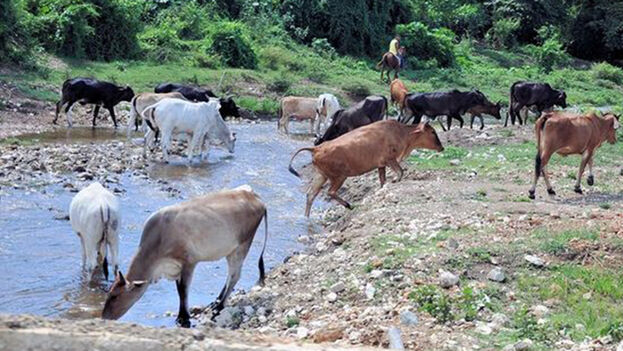
![]() 14ymedio, Havana, 15 January 2023 — The theft and slaughter of cattle in the province of Las Tunas reached historical figures at the end of 2022, with an increase of 71% in cases compared to 2021. These facts, added to the loss of productivity due to lack of water and food for the animals, affected the production of meat and milk, according to an article published this Sunday by Newspaper 26 .
14ymedio, Havana, 15 January 2023 — The theft and slaughter of cattle in the province of Las Tunas reached historical figures at the end of 2022, with an increase of 71% in cases compared to 2021. These facts, added to the loss of productivity due to lack of water and food for the animals, affected the production of meat and milk, according to an article published this Sunday by Newspaper 26 .
The provincial newspaper indicates that during the past year there was a “notable increase” in crimes against large livestock — such as theft, illegal slaughter or robbery with violence — which at the end of 2022 totaled 5,305 events. This meant an increase of 2,207 cases compared to the 3,098 reported in 2021, and two times more than in 2020, when there were 2,394.
The municipalities of Las Tunas, Jobabo and Majibacoa concentrated most of the crimes, which frequently occurred due to the lack of care by private or state owners, according to information shared during a meeting between producers and authorities from the Ministry of Agriculture.
According to the article, the private sector suffered more cases of cattle thefts because it concentrates 80% of the province’s bovine mass, especially equine cattle that are easier to move and are used for various production or consumption purposes. “Activity that deteriorates several productive indicators such as the collection of milk and beef, with its consequent impact on the nutrition of children and pregnant women, fundamentally,” the newspaper says.
Official data shows that the crimes did not stop, despite the fact that in August 2022 the Cuban government approved new sanctions to prevent irregularities in the breeding and trade of cattle, which entails fines of up to 20,000 pesos.
In this regard, in the meeting with the producers it was highlighted that the farmers’ surveillance brigades do not work, in addition to the fact that huntsmen are needed in the dairy farms and there are several failures in the infrastructure, such as poorly constructed fences. There is also not enough security in the pens where the cows feed, which are infested with weeds, so it is common to see the animals loose on the tracks and in pastures.
Manuel Pérez Gallego, member of the Central Committee and first secretary of the Communist Party in Las Tunas, promised that the security forces will increase surveillance in the neighborhoods, as well as develop activities for the development of the sector, which in 2022 decreased by 4,400 heads of cattle due to “mismanagement and insufficient availability of water and food.”
At the meeting, the producers denounced that the modus operandi of the gangs of thieves is based on reaching the farms with threats to the ranchers and their families, and they commit the crimes with “total impunity.”
This happened in Cienfuegos this week with the murder of Yordany Díaz, a producer from Juraguá, from the Cienfuegos municipality of Abreus, who confronted a gang of thieves that was dismembering a cow that had been killed on his property. According to the neighbors, the man was “vilely beheaded” by the criminals, according to Alejo Bermúdez reporting on social networks.
In the midst of an economic crisis and scarcity, the theft of cattle has skyrocketed in recent years by groups that then sell the meat on the black market, at prices impossible for the majority of Cubans. Although the Government usually blames the producers for not monitoring their farms, the farmers claim that the uniformed officers do not provide security either and do not follow up on various cases of complaints.
The black market for beef is the final destination for many of these stolen cows, despite the fact that in 2021, and for the first time in decades, the Cuban authorities authorized ranchers to slaughter their cattle and market the meat and other derivatives. The measure sought to encourage livestock production and reduce illegal slaughter, often perpetrated by the owners themselves, but three years after this easing, animal theft has not been stopped.
____________
COLLABORATE WITH OUR WORK: The 14ymedio team is committed to practicing serious journalism that reflects Cuba’s reality in all its depth. Thank you for joining us on this long journey. We invite you to continue supporting us by becoming a member of 14ymedio now. Together we can continue transforming journalism in Cuba.
